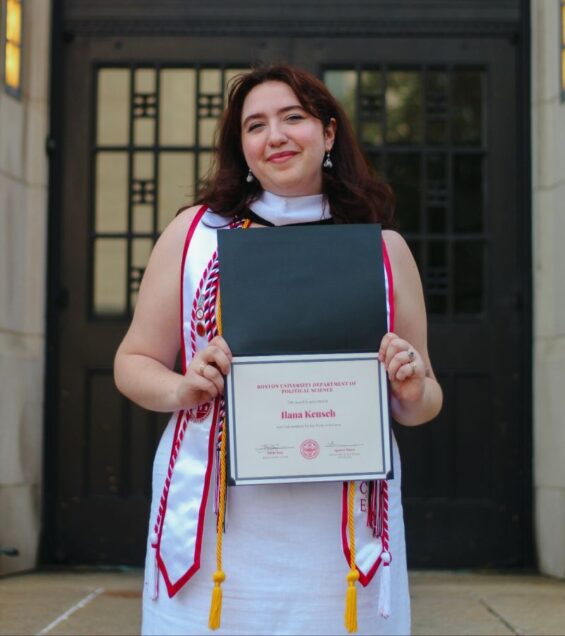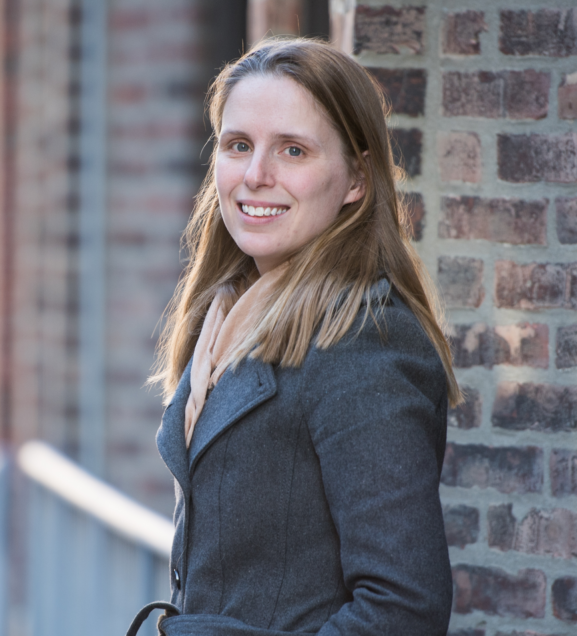Tracking responses to the MBTA Communities Act
BU Politial Science class learns from controversial zoning change
BU Politial Science class learns from controversial zoning change
After taking “Inequality & American Politics,” Ilana Keusch saw her Brookline neighborhood through a new lens.

Keusch (CAS`24, GRS`24), a political science BA/MA student, was assigned in Fall 2023 to study Brookline’s response to the controversial MBTA Communities Act — which requires towns and cities with public transportation to change their zoning laws to allow multi-family housing around transit stations and in other dense areas. As a resident of Brookline, she felt she needed to better understand the housing policies that dominate local politics.
“I’ll walk down different streets like Harvard Street, which was hugely contentious in this process,’” Keusch said. “I’m there all the time for groceries. So it’s very fun to go down there and be like ‘oh, this is what they were talking about.’”
The MBTA Communities Act was intended to encourage developers to build much-needed housing in towns and cities around the Commonwealth. But since its inception in January 2021, the act has caused turmoil among housing advocates and opposition groups fearful that such development will change the character of their communities.
Associate Professor of Political Science Katherine Levine Einstein, a housing policy expert and co-author of “Neighborhood Defenders: Participatory Politics and America’s Housing Crisis,” wanted her CAS PO 519: Inequality & American Politics students to figure out why.

Einstein’s class is part of the MetroBridge experiential learning program, run through the Initiative on Cities, which aims to support both the BU community and local governmental organizations through course projects. Einstein’s students were assigned four towns where the law is initially being enforced — Arlington, Newton, Brookline and Milton. There they attended public hearings and town meetings, interviewed local officials and advocates on both sides of the debate, reviewed previous meetings and plans, and observed local online forums.
At the end of the project, Einstein and her students authored a policy brief, “Political Lessons Learned from the Initial MBTA Communities Act Rollout,” which identified key findings from their semester’s research. They presented their results at ““Zoning for Change: Insights from the MBTA Communities Act Implementation.,” a conference hosted by the Initiative on Cities.
“Massachusetts communities essentially have to change their land-use policies to allow more housing to be built. And this can be deeply controversial. There are lots of people who are very opposed to seeing their communities change in any way,” Einstein said. “We looked at the different housing groups and opposition groups that are involved in the process, how the processes have worked to try to comply with MBTA communities, and what sort of strategies these different organizations are using.”
Of the four communities, Newton was assessed by Einstein’s students as having “minimum compliance” to the MBTA Communities Act — a result of timely elections and tailored organizing. In Massachusetts, City Council elections do not coincide with presidential elections. Students found that because of this timing, there tends to be a lower turnout at local elections and those that are in attendance are usually older, white, homeowners — skewing the communities’ vote to favor the group in attendance. The timing of Newton’s elections meant that the city did not elect candidates who were in favor of the MBTA Communities Act.
In Arlington, students found that an overwhelming majority of voters were in support of an implementation plan, though only 40 percent of the public forum comments shared that support — meaning the loudest voices do not always represent the broader community.
In Milton — the only community not in compliance with the act to any degree — the students witnessed strong vocal opposition from Milton groups. A pro-housing vote passed with a large majority (158 to 76.4) in a December 2023 town meeting but was then overturned by a referendum in February 2024.
 Contrary to other groups’ findings, Keusch said, Brookline took a progressive stance. Brookline voted on two implementation plans — one that was doing a bit more than absolutely necessary and one that was doing the bare minimum to be in compliance with the act, Keusch said. In November 2023, Brookline approved a plan that proposes an 800-unit increase and allows construction of four-story buildings along Harvard Street without a special permit.
Contrary to other groups’ findings, Keusch said, Brookline took a progressive stance. Brookline voted on two implementation plans — one that was doing a bit more than absolutely necessary and one that was doing the bare minimum to be in compliance with the act, Keusch said. In November 2023, Brookline approved a plan that proposes an 800-unit increase and allows construction of four-story buildings along Harvard Street without a special permit.
This was the more progressive option, Keusch said, but she said the bill might not even result in more housing.
The MBTA Communities Act itself doesn’t require the housing to be built. It just requires that it’s rezoned, so housing could be built,” she said. “This passing was a huge, huge win for progressive housing politics. But the fact that it’s a huge win and doesn’t require that housing be built and doesn’t require that affordable housing is crazy. It’s just allowing that housing to possibly maybe be built in the future. And so, along with that, the amount of pushback that it was getting among localities was just crazy.”
The bill was passed by the town meeting before Keusch presented her project. But Keusch’s group did a process-tracing activity to examine what going forward would look like, and what community members’ thoughts were on the way the bill was handled. Political controversy divided the town’s reactions to the proposed bill. Groups in opposition to the increased housing density plan shared the “not in my backyard” mentality that describes residents’ attitudes toward the construction of new housing, Einstein said.
“This doesn’t mean that there’s going to be tenements in your backyard. It just means that we can probably build a few more like triple deckers or duplexes,” Keusch said. “That was a big thing that they were trying to push in Brookline, that multifamily housing doesn’t mean huge apartment blocks. It could be a duplex or a triple-decker or like a four or five apartment unit. That is still really, really effective.”
Einstein says studying the housing debate is useful learning tool for students, since it is not determined by political affiliations. “It’s not necessarily a place where things always fall neatly along Democratic and Republican lines,” Einstein said. “In some ways, I feel like that makes it a more heartening place for students to get involved because it doesn’t feel as ideological in the same way.”
And Keusch, who is headed to a doctoral program in politics at Princeton University, said the process did teach her a lot about local politics.
“There was a really big coalition of people that came together and the opposition was more individualized. But then when talking to people, there was actually more fracturing at the end than it seemed but there was kind of a face validity like a face on face value coalition when you got to town meetings,” she said. “I’d be surprised if anyone wasn’t frustrated. We’re in a very frustrating position right now, where it’s very hard to get things done that aren’t baby steps.”